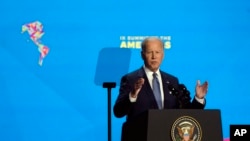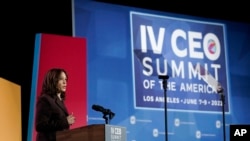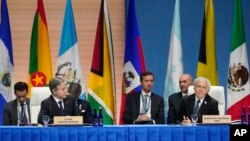U.S. President Joe Biden is in Los Angeles Wednesday to host the ninth Summit of the Americas, a gathering of leaders from the countries of North, South and Central America and the Caribbean.
“Our region is large and diverse. We don't always agree on everything, but because we're democracies, we work through our disagreements with mutual respect and dialogue,” Biden said during the summit’s inaugural ceremony.
The summit has been overshadowed by the decision of the leaders of Bolivia, Guatemala, Honduras and Mexico not to attend after the U.S. excluded Cuba, Nicaragua and Venezuela because they did not meet the requirements of the 2001 Inter-American Democratic Charter that enshrines democracy as a core value of the gathering. The president of Uruguay is also skipping the gathering after testing positive for COVID-19.
Biden launched what the White House bills as the Americas Partnership for Economic Prosperity to promote an “equitable recovery” from the pandemic as well as more than $300 million in food insecurity aid to a region reeling from the economic impacts of COVID-19 and the war in Ukraine.
Biden said his regional vision is “grounded on the same core values” as the U.S. economic recovery and competitiveness.
“The American Partnership will help economies grow from the bottom up and the middle out, not the top down,” he said. “Trickle-down economics does not work.”
A senior administration official told reporters on Wednesday that the administration hopes to present the framework and then discuss it with partners over the next “two to three months, aiming to really launch the beginning of formal negotiations.”
The plan will not include new trade agreements and the administration official did not provide an estimate on how much money Washington might commit to the effort.
She said the framework rests on five pillars: strengthening supply chains and “helping our hemisphere reduce overdependence and concentrations on certain countries”; bolstering and encouraging investment from the Inter-American Development Bank, the largest source of development financing for Latin America and the Caribbean; boosting investments in public sector areas like education, health, entitlements and child care; promoting clean energy jobs and initiatives to lower carbon footprints and finally, promoting sustainable and inclusive trade.
Unlike the Indo–Pacific Economic Framework (IPEF), the “economic vision” to counter Chinese clout that Biden launched in Tokyo in May with 13 countries on board, the Americas Partnership for Economic Prosperity has no country participation attached to it as of yet. Neither framework includes provisions such as tariff cuts and other market-access tools that Washington traditionally uses to incentivize partners.
In his remarks during the summit’s inaugural ceremony, Biden did not contrast his economic vision for the region with Beijing’s, which is the largest trading partner for many countries in the hemisphere.
Many Latin American countries already have free trade agreements with Washington – including Chile, Colombia, Costa Rica, the Dominican Republic, El Salvador, Guatemala, Honduras, Mexico, Nicaragua, Panama and Peru.
Others, including Argentina, Brazil, Ecuador, Paraguay, Uruguay and several Caribbean nations, have signed on to less comprehensive Trade and Investment Framework Agreements with the U.S. that facilitate dialogues on trade and investment issues such as labor, environmental and intellectual property protections.
With Trump-era protectionist sentiments still running high, the administration and Democrats in Congress appear unenthusiastic about the political cost of opening American market access. Still, with the focus on green investments and economic digitalization, there is “tremendous potential” to build economic ties between the United States and the region, said P. Michael McKinley, a former U.S. ambassador to Peru, Colombia and Brazil.
“But it does have to include some hard initiatives, and I believe it has to include significant commitment of resources,” he told VOA.
On Monday, Vice President Kamala Harris hosted a roundtable with business executives as part of her push for investment in the Northern Triangle countries of Guatemala, Honduras and El Salvador to help stem the root causes of migration. The White House said the initiative that Harris launched in May 2021 has generated more than $3.2 billion of investments in the region from 40 companies and organizations.
Other migration initiatives, including a regional pact to help communities that host migrants, will be the summit's focus later in the week.
Health initiatives
Biden and leaders are set to adopt an “Action Plan on Health and Resilience in the Americas” that the administration says will help countries prepare for future pandemic threats.
On Wednesday, the administration announced “Americas Health Corps,” a new initiative aimed at improving the skills of 500,000 health workers across the region.
The U.S. will contribute to some of the $100 million cost of the training program and seek to raise funds for the rest, including through the Pan American Health Organization.
The administration has donated more than 65 million doses of COVID-19 vaccine to the region and $94 million in aid to get those shots in arms. The administration's request for $5 billion for global pandemic funding, however, has been stuck in Congress for months, largely because of Republican lawmakers who say they won't pass it unless the administration brings back Title 42. The Trump-era order allows authorities at the Mexican border to turn away migrants during a pandemic emergency.
There have been more than 2.7 million COVID-19 related deaths in the Western Hemisphere, approximately 40 percent of the global total.
This is the second time that the U.S. is hosting the summit. Former President Bill Clinton convened the first Summit of the Americas in Miami in 1994 to promote economic growth based on shared democratic values and the promise of increased trade and commerce. Former President Donald Trump did not attend the last summit in Lima, Peru, in 2018.









